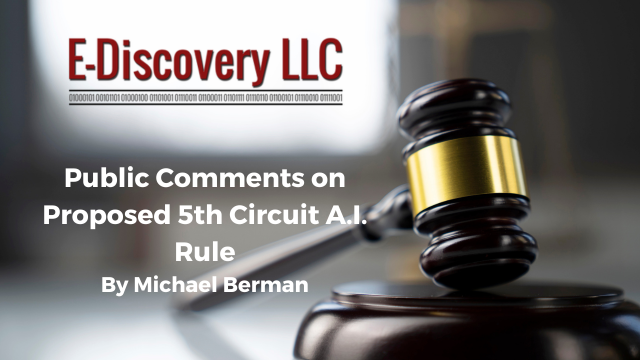 Image: Kaylee Walstad, EDRM.
Image: Kaylee Walstad, EDRM.
In Attys Split On 5th Circ.’s Proposed AI, Accuracy-Check Rule – Law360 (Jan. 30, 2024), Lauren Berg reported on the current status of a 5th Circuit proposed A.I. rule.1
Ms. Berg’s article stated that reactions “span from one end of the spectrum to another, with some saying it will stifle the benefits of generative AI, and others saying it should simply stomp out the use of AI in court documents.”
Brian King, Esq., is quoted as having written that: “‘AI‐focused court rules,’ like Cabbage Patch Kids, pet rocks and fidget spinners, are a passing fad that may bring us some amusement but add nothing to substance….” Id. Layne E. Kruse, Esq., and Warren S. Huang, Esq., wrote that, in light of existing obligations “the proposed rule is unnecessary.” Id.
….e disclosure requirements threaten the sacred attorney work product privilege…the combination of research tools that I use for my briefs and filings are a proprietary matter between my clients and me, and not a topic I feel comfortable broadcasting in a public court disclosure.
Carolyn Elfant, Esq. Public comment excerpt for the proposed 5th Circuit rule on AI.
Others2 sought to refine the proposal. For example, Martin Stern, Esq., suggested that the requirement of review by a “human” should be replaced with review by a “lawyer.”
One firm “has adopted a policy that generative AI will not be used in the production of legal documents.” Id. The firm wrote that GenAI is “potentially destructive to quality lawyering.”
The public comments are posted at submitted-comments-compiled.pdf (uscourts.gov). One commentor wrote: “This doesn’t go far enough. Not even close. This is almost worse than no policy at all.”
Another suggestion was for technological neutrality, i.e., that all filers must certify that citations and arguments were reviewed for accuracy. In a similar vein, another wrote that: “As an example, before ‘AI’ became a thing, a lawyer could find an unrelated brief on the Internet, or copy caselaw or statutes without making sure they are up to date or even real, and paste them into a brief. We don’t need a special rule to say those specific acts are wrong.”
There is also a difficulty in the definition of generative artificial intelligence. Westlaw, one of the research services most lawyers use, now incorporates a generative artificial intelligence function in its Precision product. If lawyers use Westlaw Precision, must they now double-check citations? How does one double-check Westlaw?
Thomas C. Wright, Esq. Public comment excerpt for the proposed 5th Circuit rule on AI.
Carolyn Elfant, Esq., wrote that “e disclosure requirements threaten the sacred attorney work product privilege.” She added “the combination of research tools that I use for my briefs and filings are a proprietary matter between my clients and me, and not a topic I feel comfortable broadcasting in a public court disclosure.” Thomas C. Wright, Esq., took a similar position: “[R]equiring a lawyer to disclose to the opposition whether they have used AI in drafting a brief is a serious invasion of the work-product privilege. What processes a lawyer uses to write a brief should be protected by that privilege.”
David Coale, Esq., raised interpretative issues: “[I]t’s not clear when a lawyer ‘uses’ generative AI. (Is it when she considers a computer’s proposed language during a search and rejects it? Or incorporates it in a draft but then writes over it in later edits, keeping just a few words?)…. [E]ven the most conscientious attorney will have trouble knowing for sure what software may use a ‘generative’ feature, and how the software may do so if it does.”
Mr. Wright agreed: “There is also a difficulty in the definition of generative artificial intelligence. Westlaw, one of the research services most lawyers use, now incorporates a generative artificial intelligence function in its Precision product. If lawyers use Westlaw Precision, must they now double-check citations? How does one double-check Westlaw?” He added that Microsoft Word uses A.I., in its Copilot function. Others pointed to similar functions in Lexis.
Some expressed concern that the proposed rule would discourage the use of A.I., stating that the use of A.I. could benefit the Court and the public. Andrew R. Lee, Esq., wrote that “[t]he bottom line is that generative AI tools excel at processing and analyzing large volumes of data, and an effective GAI tool can search through vast databases of legal literature and efficiently identify relevant information much faster than a human researcher could.”
Additional details can be found in the posted comments and the Law360 article, Attys Split On 5th Circ.’s Proposed AI, Accuracy-Check Rule – Law360.
Suzanne Monyak also wrote an article, Fifth Circuit AI Rule Criticized as Unnecessary, Ambiguous (bloomberglaw.com)(Jan. 29. 2024); accord Nate Raymond, Lawyers voice opposition to 5th Circuit’s proposed AI rule | Reuters (Jan. 29, 2024).
Notes
1 I previously blogged about the proposed A.I. Rule in the 9th Circuit. “Ninth Circuit Creates Panel to Study Artificial Intelligence”, on the use of rules-based approaches to A.I., Should Courts Use Standing Orders or Local Rules to Address A.I.?, and on Florida Adopts Ethics Guidelines for Use of Generative A.I.
2 I have not named each submitter in this blog. The names and comments are posted on the Fifth Circuit website. In some instances, several people raised similar issues and I have not made any comprehensive edit to cite all of them.